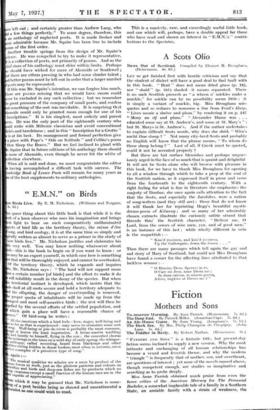A Scots Olio
News Out of Scotland. Compiled by Eleanor M. Brougham: (Heinemann. 8s. 6d.) News Out of Scotland. Compiled by Eleanor M. Brougham: (Heinemann. 8s. 6d.) LET us get finished first with hostile criticism and say that the student of dialect will have a good deal to find fault with in this book. " Bent " does not mean dried grass (p. 18), nor " shaid " (p. 101) shaded—it means separated. There is no such Scottish proverb as " a wheen o' mickles maks a muekle," for 'pickle can by no possibility mean little : it is simply a variant of muckle, big. Miss Brougham mis- quotes and so reduces to nonsense a line from Ford's Harp, " Lives monie a shelve and plum," by rendering it on p. 247 " Mony an elf and plum." " Alexander Hume was . . . educated some say at St. Andrew's, and some at St. Mary's " ; but St. Marys is St. Andrew's. And if the author undertakes to explain difficult Scots words, why does she shirk " Wha's aucht thae sheep ? " Not many city-bred Scots and probably no English will know that the phrase means, " To whom do those sheep belong " Last of all, if Creek must be quoted, could it not be accented properly ?
But these are but surface blemishes and perhaps ungriw- iously urged in the face of so much that is quaint and delightful It will not be Scots alone who will browse with pleasure in this book, for we have to thank Miss Brougham for opening to all a window through which to take a peep at the soul of the Scottish nation, as it expressed itself in prose and verse from the fourteenth to the eighteenth century. With a right feeling for what is line in literature she emphasizes the majesty of Dunbar, she once again calls attention to the fact that the Scots, and especially the Jacobites, were a nation of song-writers (and they still are) ; those that do not know it will thank her for reprinting Hogg's beautiful mystic dream-poem of Kilmeny ; and so many of her admirably chosen extracts illustrate the curiously satiric strand that threads thro' the Scottish character. " Deliver me, 0 Lord, from the errors of wise men, yea, and of good men," is an instance of this last ; while wholly different in vein is the coquettish :- " Kiss 'd yestreen, and kiss'd yestreen, Up the Gallowgate, down the Green . . . "
Then there are many passages which tell again the gay and sad story of Mary of Scotland. but could not Miss Brougham have found a corner for the affecting lines attributed to that luckless woman :-- " 0 Domino Deus, Speravi in to, 0 Care mi Jest], none libera me ; In dura catena, in misera poena, Adoro, imploro ut liberes me I "














































 Previous page
Previous page